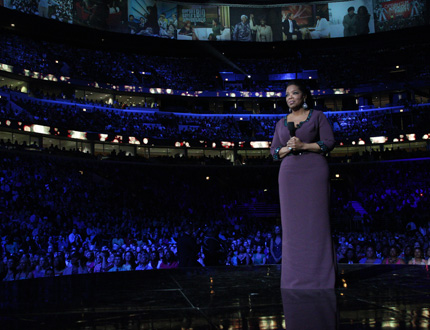The Oprah Winfrey Show episode that serves as a defining moment for me is one I didn’t see, and the memory of this moment isn’t exactly a good one.
It happened some time between 2004 and 2007. I assume the subject of the show had to do with either sex or interracial dating because variations in penis sizes came up. A friend who had been watching this particular episode called me, briefed me on the subject that I now can’t recall and said, “Oprah just said on her show that the ‘myth’ about black men is true.â€
I didn’t need to ask her to clarify. “So Oprah Winfrey just told an audience of white housewives that black men have bigger …?†I said.
“Yes! Thank you. You saw exactly where I was going with this. And now she’s got this audience of like 200 white women blushing and screaming.â€
“No, Oprah, no,†I said, shaking my head as my friend continued describing the revelation delighting, or at least piquing the curiosity of, the millions of women who were watching.
The moment was a reflection of how far I felt Oprah had drifted from her roots. Was she so accustomed to the mores of white housewives and so out of touch with those of black people in general that she forgot how easily stereotypes stick to us and how restrictive they can be?  Did she not consider that her testimony as the Queen of Daytime Talk and the most influential celebrity in the world could influence the hyper sexualized images of people of her same color?
For a while, I felt Oprah had forgotten her own. I can remember reading articles by black commentators calling Oprah a white woman and thinking, “When you’re a billionaire, you can be whatever you damn well please,†but still understanding what they meant and to a certain extent, agreeing with them. True, a woman who builds schools in South Africa, takes hundreds of viewers on vacation to Australia, shops (and gets discriminated against in stores) in France, lives in Santa Barbara and tapes a show in Chicago that airs in 150 countries belongs to the human race. But I felt a woman as powerful as that could have and should have been using her show to tell the stories of people who were like her but who had no power and no voice, stories you heard about as they spread virally through social media—stories like that of like Jamie and Gladys Scott, who were serving double life sentences in unconstitutional conditions for a robbery in which no one died and only $11 were stolen, and who were suffering through this in Oprah’s home state of Mississippi. (Two years before the NAACP took up their cause, I heard about the sisters on W.E.A.L.L.B.E. News Radio.)
Instead, Oprah helped survivors of sexual abuse. She helped the obese. She ignited writing careers. She donated enough money to Morehouse College to get more than 400 men through to graduation. She built homes for survivors of Katrina. She brought joy to people by sharing her favorite things and giving away cars. She empowered women to embrace and express their sexuality. She made the “normal†people learn from the outcasts, made the outcasts feel accepted and showed us how uniquely human and therefore deeply connected we all are.
I’ve been incredibly disappointed with Oprah’s devotion to Tyler Perry, and I’m mad at her for inviting Tom Cruise back after he jumped on her furniture. But as I watched her cry in response to the tributes to her during her farewell spectacular, I found myself admiring her look. Her brown skin, her full lips, her wide nose, her wrinkles—features she’s had more than enough money and opportunity to change, features not considered beautiful until she showed what she could do in spite of other people’s perceptions of them.
So despite my issues with her, I have to agree with the celebrities, friends and fans who celebrated her for two episodes. She is an inspiration to millions, and I can’t imagine daytime TV without her.


I am not an Oprah fan and I won’t miss her. Let me rephrase that…..I don’t like Oprah’s influence on America. Let me rephrase that….I find it unbelievable that millions of women and men can just blindly follow a person. If Oprah and Jesus had shows in the same time slot, Jesus would go unheard unless Oprah told the people to go watch.
Oprah has no children but her child rearing tips are gospel. Oprah makes a racist, ignorant statement about black men and their genitals, and the media doesn’t even whimper. While I appreciate the shout out, it’s a foolish statement nonetheless.
I have to admit that I am happy that a black woman can become a billionaire in America; I still won’t miss Oprah.
Lol! My boyfriend at the time “appreciated the shout out,” too. He went as far as to say, “Can you imagine the humiliation if she hadn’t confirmed the myth?”
I don’t know that millions of people followed her blindly. She was on for 25 years; at least some of them listened to her daily, and when you let someone into your living room–even through the TV–daily for a long period of time, you start to feel like they’re your friend, or at least someone trustworthy. That’s my theory about why soap operas have stayed around so long, too. When I hear my grandmothers and cousins or women in the grocery store talking about soap opera people’s lives, I’m surprised by the gusto in their voices. They are genuinely attached to these characters.